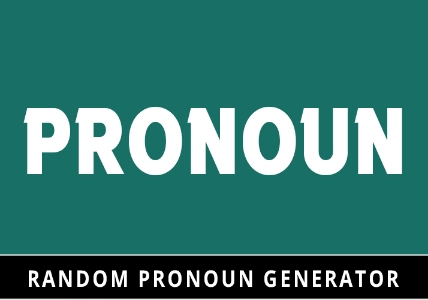Our Random Pronoun Generator is a valuable online tool that helps writers, language enthusiasts, and learners easily select random pronouns for their text or language practice.
Pronouns play a crucial role in effective communication, and the Random Pronoun Generator simplifies this process by instantly generating pronouns at the click of a button.
How to Use Our Random Pronoun Generator?
- Step #1. Go to our Random Pronoun Generator tool.
- Step #2. Specify the number of pronouns needed.
- Step #3. Click "Generate" to obtain a random pronoun.
- Step #4. Repeat for more pronouns as desired.
Simplifying Speech: The Power of Pronouns
A linguistic term, pronouns are words used to replace or substitute nouns. Speakers and writers utilize pronouns to refer to people, objects, or ideas without repeating nouns, simplifying communication and enhancing language flow.
Different types of pronouns serve specific purposes in constructing sentences. The primary types include:
-
Personal Pronouns
Personal pronouns stand for particular people or groups. Examples are "he," "she," "it," "they," "we," and "you." These words shift slightly depending on their role in a sentence. For instance, "I" transforms into "me" when it's the one receiving the action.
Example: She is going to the store. I will join her later. -
Demonstrative Pronouns
These pronouns point to specific items or people. Common demonstrative pronouns include "this," "that," "these," and "those."
Example: This is my favorite book. -
Relative Pronouns
Introduce relative clauses and link them to the main clause. Well-known relative pronouns include "who," "whom," "whose," "which," and "that."
Example: I have a friend who can speak multiple languages fluently. -
Interrogative Pronouns
These pronouns ask questions. Common interrogative pronouns include "who," "whom," "whose," "which," and "what."
Example: What do you want for dinner? -
Indefinite Pronouns
These pronouns refer to non-specific persons or things. Examples include "someone," "anyone," "everyone," "something," and "nothing."
Example: Everybody is welcome to join the event. -
Reflexive and Intensive Pronouns
Reflexive pronouns reflect the verb's action to the subject, while intensive pronouns emphasize a preceding noun.
Reflexive Example: She hurt herself while playing.
Intensive Example: I myself will handle the situation.
Know more about Pronoun on Wikipedia
Frequently Asked Questions (FAQs)
-
What is the Random Pronoun Generator?
Our pronoun generator is an online tool designed to assist writers, language enthusiasts, and learners easily select random pronouns for their text or language practice.
-
How does the Pronoun Generator work?
Our generator allows users to specify the number of pronouns they need. Then, with a click of the "Generate" button, it provides a random pronoun for immediate use.
-
What benefits does this Pronoun Randomizer offer?
Our tool is valuable for adding variety and spontaneity to your language practice. It's particularly useful for writers seeking diverse pronoun usage or language learners looking to reinforce their skills.
-
Can I customize the number of pronouns generated?
As of the current version, customization features for the quantity may be available elsewhere. However, we're continually working on updates. Stay tuned for new features that may include options to customize the quantity of pronouns generated.
-
Is the tool suitable for educational purposes?
Absolutely! Our pronoun randomizer is an excellent educational tool for language teachers and learners, offering a fun and interactive way to practice pronoun usage.
-
Is this Pronouns Generator free to use?
Yes, you can use our pronoun generator for free. There are no hidden fees or subscriptions needed.


